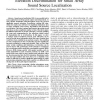Free Online Productivity Tools
i2Speak
i2Symbol
i2OCR
iTex2Img
iWeb2Print
iWeb2Shot
i2Type
iPdf2Split
iPdf2Merge
i2Bopomofo
i2Arabic
i2Style
i2Image
i2PDF
iLatex2Rtf
Sci2ools
125
click to vote
TASLP
2010
2010
Using Reverberation to Improve Range and Elevation Discrimination for Small Array Sound Source Localization
Sound source localization (SSL) is an essential task in many applications involving speech capture and enhancement. As such, speaker localization with microphone arrays has received significant research attention. Nevertheless, existing SSL algorithms for small arrays still have two significant limitations: lack of range resolution, and accuracy degradation with increasing reverberation. The latter is natural and expected, given that strong reflections can have amplitudes similar to that of the direct signal, but different directions of arrival. Therefore, correctly modeling the room and compensating for the reflections should reduce the degradation due to reverberation. In this paper, we show a stronger result. If modeled correctly, early reflections can be used to provide more information about the source location than would have been available in an anechoic scenario. The modeling not only compensates for the reverberation, but also significantly increases resolution for range and e...
| Added | 21 May 2011 |
| Updated | 21 May 2011 |
| Type | Journal |
| Year | 2010 |
| Where | TASLP |
| Authors | Flavio Ribeiro, Cha Zhang, Dinei A. F. Florêncio, Demba E. Ba |
Comments (0)

